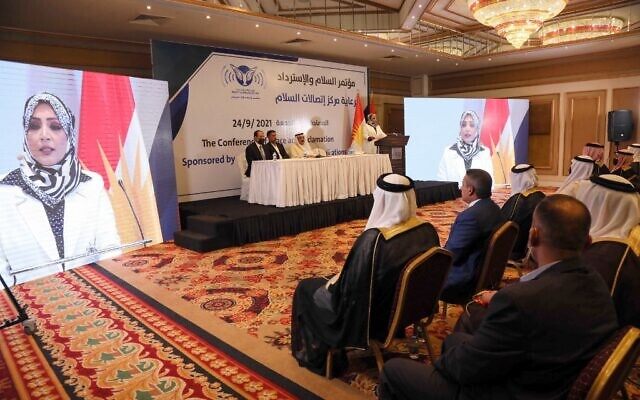
Baghdad says it will arrest all 300 participants at event in Kurdistan that called for peace, once it can establish who they are; Sahar al-Ta’i, Wisam al-Hardan were main speakers
Iraqi authorities announced on Sunday that they had issued warrants for the arrest of two Iraqis who addressed a conference calling for their country to make peace with Israel. The authorities said they would arrest all 300-plus participants once they have established who they are.
The over 300 Iraqis gathered on Friday in Erbil, in Iraq’s Kurdistan region, to issue statements backing normalization with Israel. The conference was organized by the Center for Peace Communications, a New York-based group that advocates closer ties between Israel and the Arab world.
“Israel today, as you know, is a strong country and an inseparable part of the world and the United Nations. Iraq cannot neglect this fact and live in isolation from the world,” Sahar al-Ta’i, a senior official in Iraq’s Culture Ministry, told the attendees.
“This is the manner in which the United Arab Emirates looked toward future generations and the greater good, and entered into the Abraham Accords,” al-Ta’i said, referring to the recent normalization deals between Israel and four Arab states, including the Emirates.
On Sunday, a Baghdad court issued a warrant for al-Ta’i’s arrest, as well as for the detention of tribal leader Wisam al-Hardan. The latter, who also participated in the peace conference, called for reconciliation with Israel in a Wall Street Journal op-ed published on Friday.
A third warrant was issued for the arrest for Iraqi parliamentarian Mithal al-Alousi, who has long advocated normalization with Israel but did not attend Friday’s conference.
Iraqi judicial authorities said that the remaining 300-odd participants would be arrested “as soon as their identities were determined.”
Iraq has officially been at war with Israel since the Jewish state was founded in 1948. Iraqi soldiers have fought in three successive Arab wars against Israel.
In 1991, the Iraqi dictator Saddam Hussein fired dozens of Scud missiles at Tel Aviv and Haifa in an attempt to draw Israel into the Gulf War.
Iraqi law continues to issue strict penalties to citizens and residents who maintain contact with Israelis. For decades, association with “Zionist organizations” or promoting “Zionist values” was punishable by death. A 2010 amendment to the Iraqi criminal code limited the sentence to life in prison.
In his remarks on Friday, al-Hardan harshly criticized the laws against dealing with Israelis and Zionists, saying they violated the fundamental human rights of Iraqis.
“The so-called ‘anti-normalization laws’ in Iraq are morally repugnant, and have been repeatedly exposed by the international community as an assault on human rights and freedoms of expression and association,” said al-Hardan.
Friday’s conference ignited a media firestorm in Iraq. Iraqi President Barham Salih denounced the conference as “illegal” and accused the attendees of seeking to stir up unrest.
“The recent meeting held to promote [normalization] does not represent the people and residents of Iraq. It represents only those who participated in it,” Salih said.
“Erbil must prevent these Zionist terrorist meetings. If not, the government must arrest all the participants,” said prominent Iraqi Shi’ite cleric Muqtada al-Sadr.
Following the controversy, al-Hardan appeared to attempt to withdraw his remarks. In an interview with the Kurdish Rudaw media outlet, al-Hardan said he had meant to call for the return of Iraq’s Jews, not normalization with Israel.
The gathering was held in Iraqi Kurdistan, which enjoys a degree of autonomy under Iraq’s federal system. Kurdish officials have occasionally traveled to Israel, while Israelis have quietly visited Kurdish areas as well.
But Kurdistan’s government distanced itself from the event following the controversy, pleading for other Iraqi factions to deal with the matter “more calmly.”
“We were neither aware of the meeting nor of its contents. What was expressed there is not the opinion, policy or position of [Kurdistan],” Kurdish president Masoud Barazani said in a statement.
